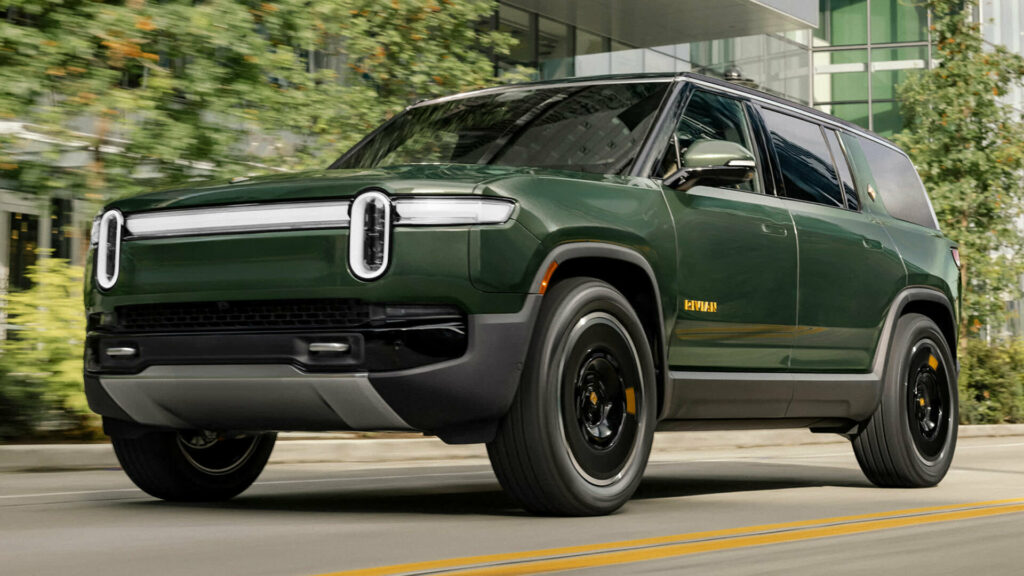Rivian CEO Says Cheap EVs Mostly Suck And He’s Finally Doing Something About It
- While Rivian builds all of its EVs on US shores, it’ll still feel the impacts of Trump’s tariffs.
- RJ Scaringe believes the only way to grow EV sales is to offer customers more choice.
- The company is readying two more affordable model lines known as the R2 and R3.
As the electric vehicle market continues to evolve, one thing has remained constant: Tesla’s commanding lead, even as it faces recent setbacks. That dominance, according to Rivian CEO RJ Scaringe, has less to do with brand loyalty and more to do with the lack of compelling alternatives, especially for buyers looking in the sub-$50,000 range.
But that may be about to change. Rivian’s upcoming R2 and R3 models are expected to come in below that price point, and with more automakers entering the space, consumers could soon have some real competition to consider
Rivian, much like Tesla in its early days, has taken the approach of launching with higher-end vehicles before branching into more affordable territory. In a recent interview with Fox Business, Scaringe emphasized that increasing consumer choice is key to growing EV adoption. More options, he said, will help drive the industry forward and increase EVs’ share of overall vehicle sales.
Read: Rivian Stacks Discounts Like Pancakes To Steal Tesla Owners After Q1 Sales Crash
“If you’re looking at buying an electric vehicle for under $50,000 today, there’s really very, very few highly compelling choices,” Scaringe said. “And for that reason, you’ve seen Tesla with very significant market share for a long time now, over 50% of the market share, and that’s actually a reflection of limited grade choices. And so what we need to see to go from 8% to 15 to 20 to eventually 100% of vehicle sales being electric, a lot of choice.”
More Models, More Buyers
Scaringe also noted that “choice” doesn’t just mean more brands offering EVs. It includes variety in styling, form factor, feature sets, and design. The broader and more diverse the lineup across the industry, the more likely consumers are to find something that fits their needs – and to leave internal combustion behind.
The Rivian CEO’s comments reflect a growing belief in the industry that EVs need to meet buyers where they are. While early adopters were often willing to pay a premium or compromise on certain features, mainstream customers are looking for affordability, practicality, and familiarity. Rivian’s push into sub-$50K territory could help shift that balance and bring more first-time EV buyers into the fold.
Tariff Troubles
The conversation with Fox also turned to trade policy, where Scaringe discussed the impact of tariffs introduced during the Trump administration. Although Rivian builds its vehicles in the United States, including motors, software, batteries, and electronics, it still depends on a complex international supply chain.
“One of the things with automotive is the supply chain is so complex, where we have hundreds of suppliers providing parts from, say, a headlight or a tow hook or tires or the structure under the skin here that are coming from not only a set of suppliers that supply to us, but those suppliers have suppliers, and then in turn, those suppliers have suppliers, so there’s tier two, tier three,” he said. “So in our case, it is a mix. Given the new environment from a tariff point of view, we’re working really hard to see what we can change, but they’re difficult to change.”

While Rivian may be less exposed than some of its competitors to US tariffs, it isn’t completely insulated. Scaringe also raised concerns about trade restrictions on rare earth elements, especially those processed in China. Though rare earths are mined in many regions, China controls a large share of the refining process, creating a chokepoint in the EV supply chain.
“When we think about the tariffs, of course the 25% auto tariff hits everybody,” Rivian’s boss added. “We do rely on a supply chain that across its tiers has a number of components that come from other countries and then, importantly, the trade restrictions and what we’re seeing in terms of rare earth metals out of China, that’s a real challenge for electric vehicles.”